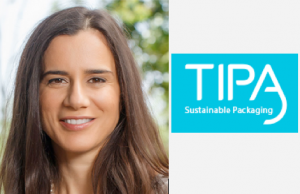Sustainable packaging developer Tipa (israel) has announced its exclusive UK brand partnership with Snact, a social enterprise making snacks from surplus product. Snact’s collaboration with Tipa is said to ensure its packaging promotes sustainability and tackling the causes of food waste.
Daphna Nissenbaum chief executive officer and co-Founder of Tipa said: “Our partnership with Snact marks a first step in the UK market. We’re currently trialling our products with a number of UK brands within the grocery retail sector and hope to see further partnerships announced as brands recognise the benefits of our technology.
“Working with such an eco-conscious brand like Snact was a natural fit for us and we’re excited to see the roll out of our fully compostable, flexible packaging in support of such a worthy brand in the fight against food waste.
“We know that many consumers would prefer to treat their food packaging as a natural part of their kitchen waste. Over 9.6 million tonnes of plastic waste is sent to landfill every year in Europe and something has to change. At Tipa, we have the solution that will be a game-changer for the industry. We look forward to the beginning of a new era in packaging where for the first time, viable end of life solutions are available on the market.”
Ilana Taub co-Founder of Snact said: “We launched our new packaging in December last year with traditional plastic as we struggled to find an environmentally-friendly option that had the functional properties required as well as being food safe. We were introduced to TIPA through another company and quickly realised it was the perfect option to build on our environmental and social ethics.
“As an environmentally-conscious brand, our customers – or Snactivists – wanted to see us leave plastic packaging behind and now we have the perfect solution to do this and build on our own eco credentials. We’ve been required to make minimal changes to production and design, simply adding a statement to show we’re proud of the move to a fully compostable pack design.”
Technology of Tipa
What if our food packaging was just like an orange peel, and returned back to nature immediately after its use?
Bio-plastics have been around for more than 20 years; yet they haven’t delivered on the promise of bringing the same packaging usefulness as plastic and then returning 100% back to nature, with no harmful impact. Tipa’s technology is about making the promise of bio-plastics real, based on deep technology innovation and multiple patents.
The vision behind Tipa was to resolve the challenge of creating sustainable flexible packaging by creating advanced bio-plastics materials. We envision packaging that can be returned back to nature after it is used, just like an orange peel becomes a part of the food waste stream.
A key technology requirement was to ensure that bio-plastic is as good as plastic in terms of:
- Shelf life and durability
- Transparency
- Sealing strength
- Printability
- Flexibility
Our products have the same mechanical properties as most ordinary plastics, serving consumers and manufactures. Consumers enjoy the same level of packaging functionality. Manufacturers get bio-plastics that meet all their manufacturing requirements and that is adaptable to their current packaging and production practices.
Tipa’s IP and know-how encompass resin, multi-layer films structures, laminates and more, enabling the creation of optimal solutions for any specific application with any desired properties. Tipa’s patented technology and strong manufacturing know-how solve a variety of issues concerning the applicability of bio-plastics to flexible packaging.
The company has a strong professional team that consists of a group of researchers and PHDs, professional experts in chemistry and bio-plastics, industrial experts and food engineers. Its team is 100% committed to make bio-based compostable plastics work in the real world and reach a mass of consumers.




















